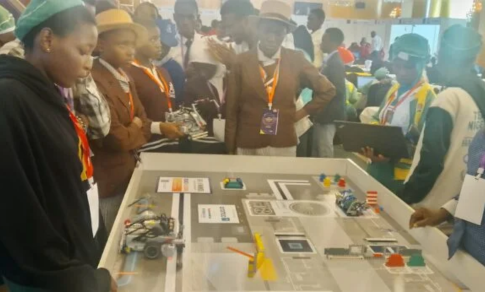In a groundbreaking moment for Nigerian football and grassroots innovation, students from Whitesands School, Lekki, Lagos, have unveiled the country’s first locally developed electromagnetic goal-line technology at the 2025 World Robot Olympiad (WRO) National Competition, held at the Oriental Hotel, Victoria Island, Lagos.
The pioneering project, developed by five senior secondary students: Chinonso Chimereucheya, Okwu Chiyem, Emukpieruo Reginald, Oshioke Williams, and Okpala Michael, was designed to provide a cost-effective and accurate solution to goal-line disputes in football, particularly for stadiums in Nigeria and across Africa.
The innovative system uses Radio Frequency Identification (RFID) technology, embedding an RFID chip inside a football and placing electromagnetic sensors along the goal line. Once the entire ball crosses the line, the system sends a signal to a referee's wristband via Near Field Transceiver (NFT), which vibrates to indicate a goal.
Unlike traditional VAR systems that rely on multiple cameras and expensive installations, this homegrown alternative is simple, fast, and affordable, removing the need for replays and reducing delays during matches.
“The idea came after a disputed goal in our school’s inter-class competition,” said Chinonso Chimereucheya, an SSS 3 student. “VAR is expensive and impractical for many schools or local stadiums, so we designed a solution using RFID chips and basic components.”
The students tested the prototype during school matches and found it reliable. Emukpieruo Reginald added that the technology could potentially be adapted to monitor throw-ins and other line-related events in football.
Their coach, Chinedu Ernest, explained that the students initiated the project independently, applying classroom knowledge to real-world challenges.
“The referee receives a vibration alert not sound, which is crucial in noisy stadiums,” he noted. “This can significantly reduce officiating disputes and is easily scalable for use nationwide.”
The project was presented under the ‘Robo Sports’ category at the WRO and was sponsored by the Arc Lights Foundation (ALF), a non-profit promoting STEM education across Nigeria and Ghana. ALF’s founder, Mrs. Abisola Obasanya, said the organization is proud to support innovations that transform learning through real-world application.
Barry Josiah, patron of the school’s Robotics and AI Club, praised the students’ mastery of core engineering principles:
“They understood how to build a sensor system that maintains signal accuracy across a full-size pitch. It’s a rare achievement at their age.”
Lagos State Commissioner for Basic Education, Jamiu Kolade Alli-Balogun, who visited the students’ stand, lauded the innovation as a sign of Nigeria’s promising future in technology and robotics:
“This is excellence in action. These students deserve national recognition.”
Alongside Whitesands’ breakthrough, Bright Sun School, Ikeja, showcased a robotic tennis game, also under the Robo Sports category. In total, 44 schools from across the country presented innovative tech solutions during the 2025 WRO.








ADD A COMMENT :